Postmortem
A long time ago, a young man was conversing with someone who lied between acquaintance and friend. He was an aspiring game developer, not yet published, but quite eager to tell you the story of the massive RPG he would someday create, and this eagerness lead to just that, as he told this tale to the person sitting before him.
But the response he received, while unsurprising, was heartbreaking: "I don't really do take turn games."
Everyone had heard it before. "It's slow", "it's unrealistic", "it's goofy", "it's unexciting", this was nothing new to our developer hero. But when his conversation partner revealed his own explanation, this was something new that piqued his interest.
To paraphrase, he didn't like most turn based games because damage is unavoidable, and out of the control of the player. He didn't mind games like the Mario and Luigi series, as a skilled player could avoid all damage, but to him, taking damage was associated with being punished for making a mistake, and thus the unavoidable damage in most RPGs felt unfair.
Ever since I talked to that person, this idea had been living in my head, "rent free", as they say. What if there was a turn based game where you could avoid all damage, without QTEs and movement systems? The easy solution would be to rely on RNG, I suppose, and so this system would need to completely forgo RNG as well.
I theorycrafted this battle system for about two years ever since I had that conversation, and that battle system grew into what Re:PUNCH managed to display during the Harold jam. Since I had been working on it far longer than the actual time I was developing Re:PUNCH specifically, I think we need to go over my thought process through those years. But first...
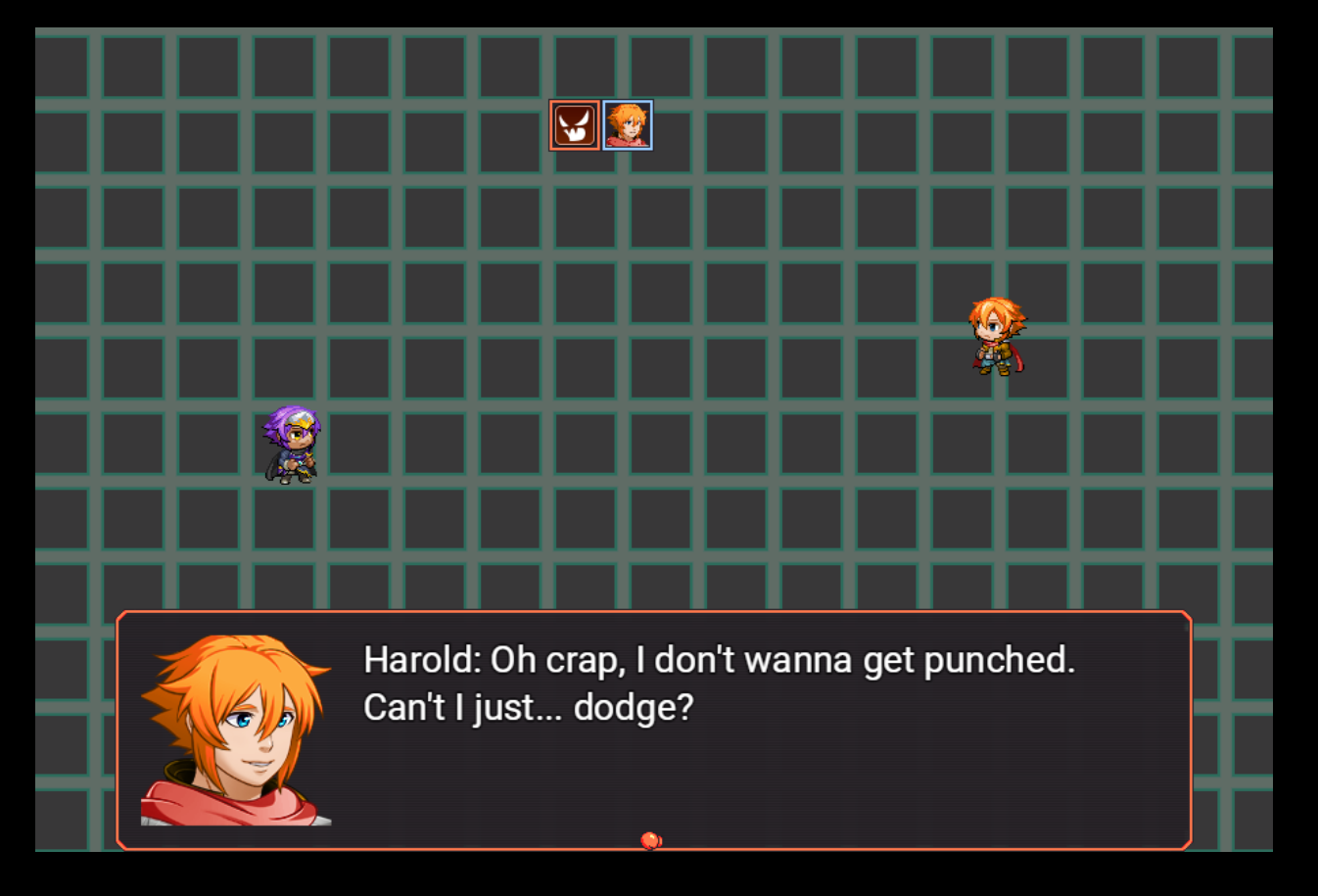
What's the point of going through all this trouble anyway?
I mean, I'm probably never going to talk to that person again, I don't even remember his name, and his opinions on RPGs are definitely not enough to sway me from loving the genre. Creating an RPG where you can avoid all damage, to many, feels like reinventing the wheel. Most people are perfectly cool with the way damage works, and the people that aren't have other genres to play.
To me, however, "if it ain't broke, don't fix it" isn't exactly good enough. There is by far a time and a place for tried and true mechanics, but if people are unwilling to try new things, the art we create will surely stagnate. Among the people who make RPGs, especially in the indie sphere, there is a noticeable lack of individuals who are interested in experimenting with new and creative turn based combat mechanics, and so for someone like me, who does take great interest in these mechanics, to be told to simply do what we already know works feels like a waste. Experimenting with battle systems is not a matter of "evolving" games in the sense that every game should employ the new mechanics that a revolutionary game invents, but rather evolving games by allowing them to continually iterate and adapt to fit the specific work, to create new ecosystems unique to the context of story and flavour.
And that's part of why that piqued my interest so much. A perfectly awesome challenge just plopped itself right in my lap, and in theory if I got this to work, we could have a new type of battle system that allows players to perfectly strategize their battles, and reward them for doing so. This would create new options for developers in this medium, and even if it didn't change the landscape of the genre, it would at least change my landscape by giving me more tools.
But that requires getting it to work.
So, no RNG, that means that we can't have any dodging or deflecting or anything like that. This immediately means that we're gonna need a skill that negates damage in some way.

For Re:PUNCH, I went with a quick an easy Dodge. You evade all damage, just like that. While thinking about the concept, I toyed with ideas like a physical and magical dodge to force you to predict which type of attack the enemy would use, but it just felt like a lot to cram into this backdoor prototype. However, I also felt that if you could dodge without consequence, it would be very easy to just keep dodging until you had the enemy's patterns memorized, so I added an additional cost to make dodging a more heavy commitment.
The side effect of adding this cost, however, was that now it was no longer fair to expect the player to know when to dodge during a fight, especially if I was discouraging them from simply writing down the enemy's patterns. This meant that I needed to make is very clear and readable when enemies would be attacking. The solution I came to was pretty simple: if an enemy has an ATK buff, they will always attack in some way, no matter what.
A problem that I had when I was making this battle system was I felt kinda worried about a catch 22: if it was too predictable, it wouldn't be engaging because the player would simply be able to figure out when to dodge, but if it wasn't predictable, it wouldn't be fair to the player. Admittedly, I was sort of wrong with this thought process generally speaking: a predictable battle system still demands that a player put in the effort to predict enemies, and a battle system where a player can't necessarily anticipate incoming attacks isn't that different from a typical RPG where you just take damage.
So ultimately, I decided to treat this as more of a puzzle game than a typical RPG. Yes, there is a specific "right" answer to every single encounter that is guaranteed to get you out with no damage every single time (in fact, there are probably multiple answers), but that isn't a bad thing because the fun part is still learning what that answer is. So, satisfied with the one-on-one aspect, I decided to take the system one step further to give an additional layer to prediction: the Aggro System.
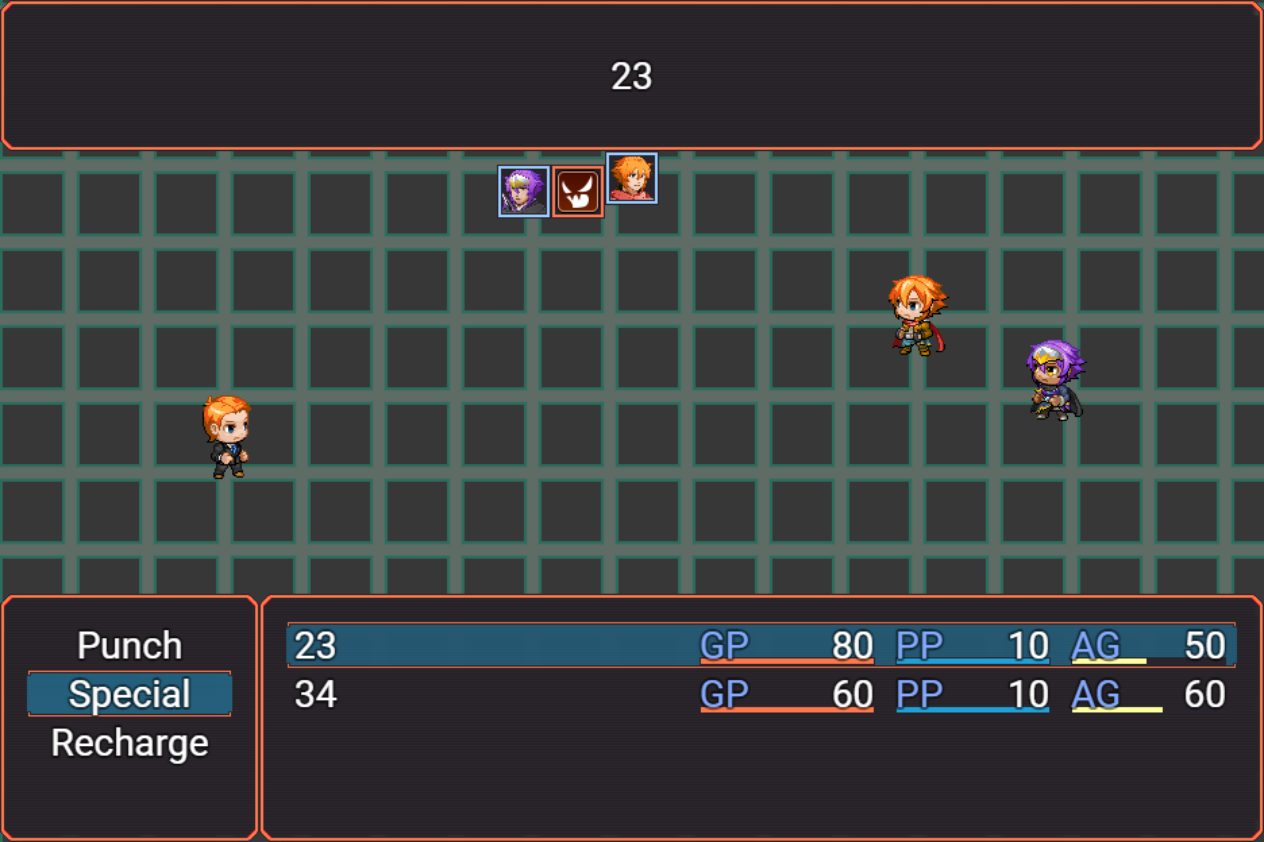
Aggro is kinda what made this battle system work, in my opinion!
Now there was more to it than just reading the enemy! If it was simply a matter of attacking when the enemy was vulnerable and dodging when they attack, it would have been a very dull game of Simon Says, but thanks to Aggro, as well as multiple party members, there are now additional choices to consider. You can attack while defending, and furthermore every action affected Aggro, meaning that you had to plan not only around what you anticipate the enemy will do, but how you expect the outcome of the encounter to influence Aggro (anyone who's played the game will tell you how terrifying it is when two characters end up sharing the same Aggro, but they might not have realized that this can only happen when you make a mistake!) Alongside Aggro, I felt it was important to give unique and varied telegraphs for how enemies would attack. This includes things like 15 starting with everyone's Aggro to the same number before using an AOE, or Tefka announcing when you "can't rely on your Aggro".
So, that's the skeleton, but we need to add some meat, too! The meat, of course, was the skills that every character had, and how they interacted with the systems. Most of the party-side skills were easy to create, things like Aggro management and strong attacks (the harder part was thinking of appropriate names for them all!) but I actually had a decent amount of difficulty coming up with skills that enemies could use to interact with these systems. By the time I had made the optional Tefka encounter, I had truly run out of ideas for unique skills! This actually worried me a good deal at first, but just like the last couple fears I've had, I needed to remind myself that this didn't mean that the battle system had already peaked, but rather that Re:PUNCH was simply too light on mechanics at the moment for me to make anything too creative. After all, with one attacking stat, a semi-useless HP stat, one enemy fought at a time, and a general refusal to double dip on any skill effects, it's only natural that I'd run out of unique skills over the course of five encounters!
So, now that the battle system was all designed, I needed to actually make it. I've been sorta jumping around timeline wise, since a lot of these concepts were decided before and after the jam period was actually running, but effectively the reason why I started actually making this battle system instead of just theorizing about it was the announcement of the 2022 Harold Jam!
I had already wanted to try my hand at a completely solo project, and being such an involved member of the RM Tester Discord, the beloved tradition of Harold Jams serve as a wonderful opportunity to try new things, which in this case for me was the damage-less battle system!
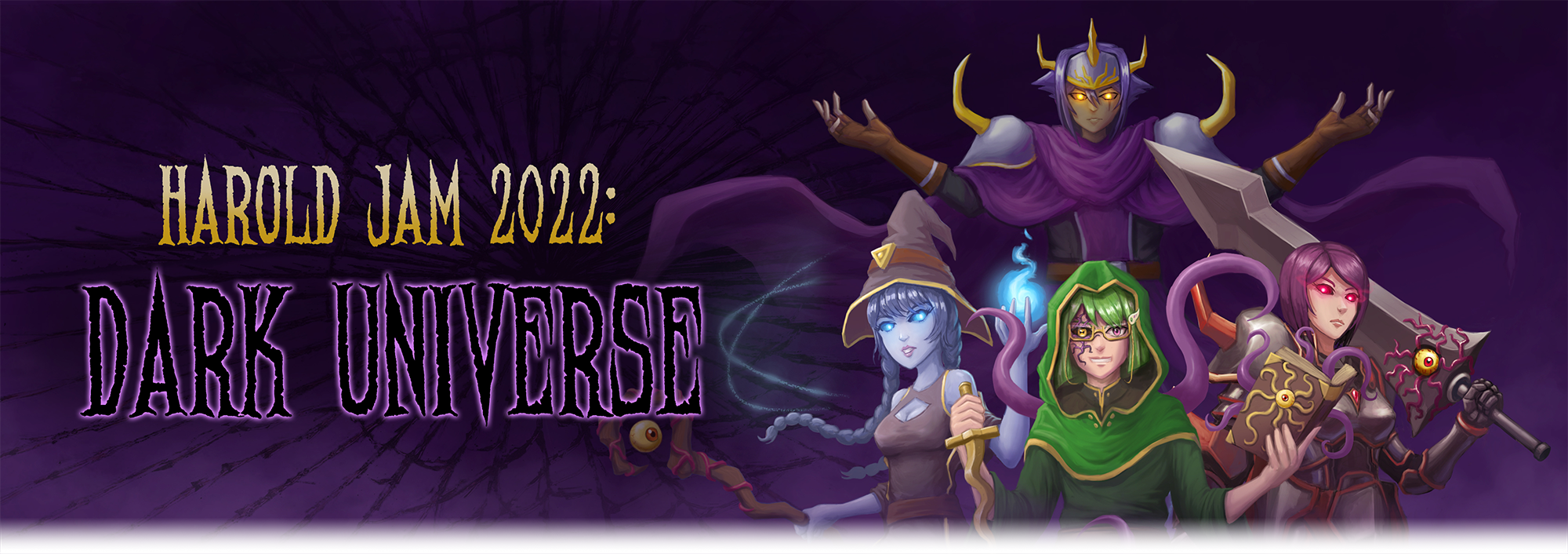
Let the jammin' begin!
So, I had limited time to work with the project, and was actually pretty worried about scope. I was making a brand new battle system with multiple battles and whatnot, so I quickly made the decision to stick with RTP (default RPG Maker) assets for this project, instead of making my sprites and tiles from scratch like I usually do. I also figured that since I was already getting one pet concept out of the way, I might as well get another taken care of too, so I dusted off an old story concept I had about regret.
You see, I, like most people, am a human, and the funny thing about humans is we have a tendency of doing some pretty cringey stuff. When I was in middle school I laughed at a deaf substitute teacher because I thought he was just doing a funny voice to be funny. Y'know, stuff like that. These weird tiny mistakes kinda haunt us for some reason, despite the fact that they often don't affect ourselves nor whomever is unfortunate enough to bear witness in the long term. Despite my logic brain being fully aware that a lot of my worst memories are things that have little bearing on the present, I can't help but wanna go back and just sock myself in the jaw, y'know?
So, this relatable sentiment lead me to construct this concept about a dude following along with his future self, punching himself in the face for doing stupid shit, before finally coming to the realization that he is who he is because of those embarrassing moments. It seemed like a nice lesson, reminding people that we are embarrassed by our past selves because we've grown to be better than them, and this concept also neatly fit a short runtime perfect for the Harold Jam, as well as being one that fits well with the no-damage battle system.
Since it's all about punching yourself in the face, I wanted that punch to feel satisfying, and so I didn't think it would cut it if you were just punching your enemies in the jaw several times before the fight arbitrarily ends. I experimented with the idea of sucker punching the dudes, with some sort of abstract "assassination" combat system where you needed to create an opening to punch the target, but finally I decided to just go with the explanation that the target is blocking your incoming punches until they can punch no more! Easy solution!
Honestly after that the game basically made itself.
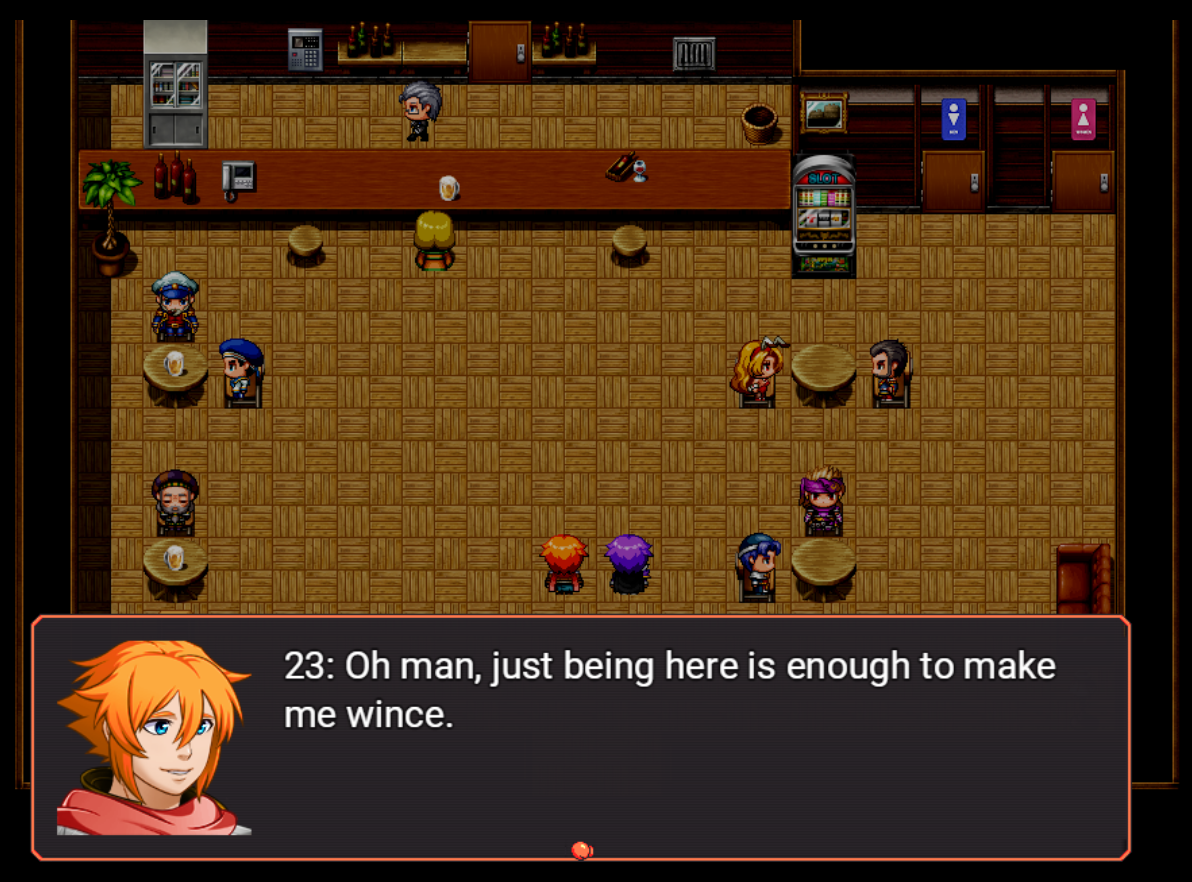
I had my battle system designed, and with such a few number of encounters and skills, it was a breeze to design (aside from the Olivia Aggro plugin crashing when a party member dies, a reasonable thing to happen in an RPG). I already knew the beginning and end of the story which meant all I really had to do was think about a few ideas that could be reasonably cringe enough to want to punch yourself over (and I chose not to draw from my own experiences both out of respect for the people I probably annoyed as well as just to make the story more creative), and I didn't even have to make any art for it since I was using RTP. The Harold Jam theme required I include two elements: the line "what have you done, Harold?" was easy to inject into a time travel narrative, especially since I had already set up that punchline earlier about the world ending or whatever, and the "dead end" requirement worked out perfectly, as I already planned on utilizing a dead-end job as one of the locations.
And then Human, the guy running the jam, told me a "dead end job" probably wasn't literal enough, so I added like three more literal dead ends.
So, I finished the game's beta in about a week, and after another 5 or so days of testing I got tired of waiting and ended up just submitting it 11 days before the deadline, becoming the third submission to the jam!
So, what did people think?
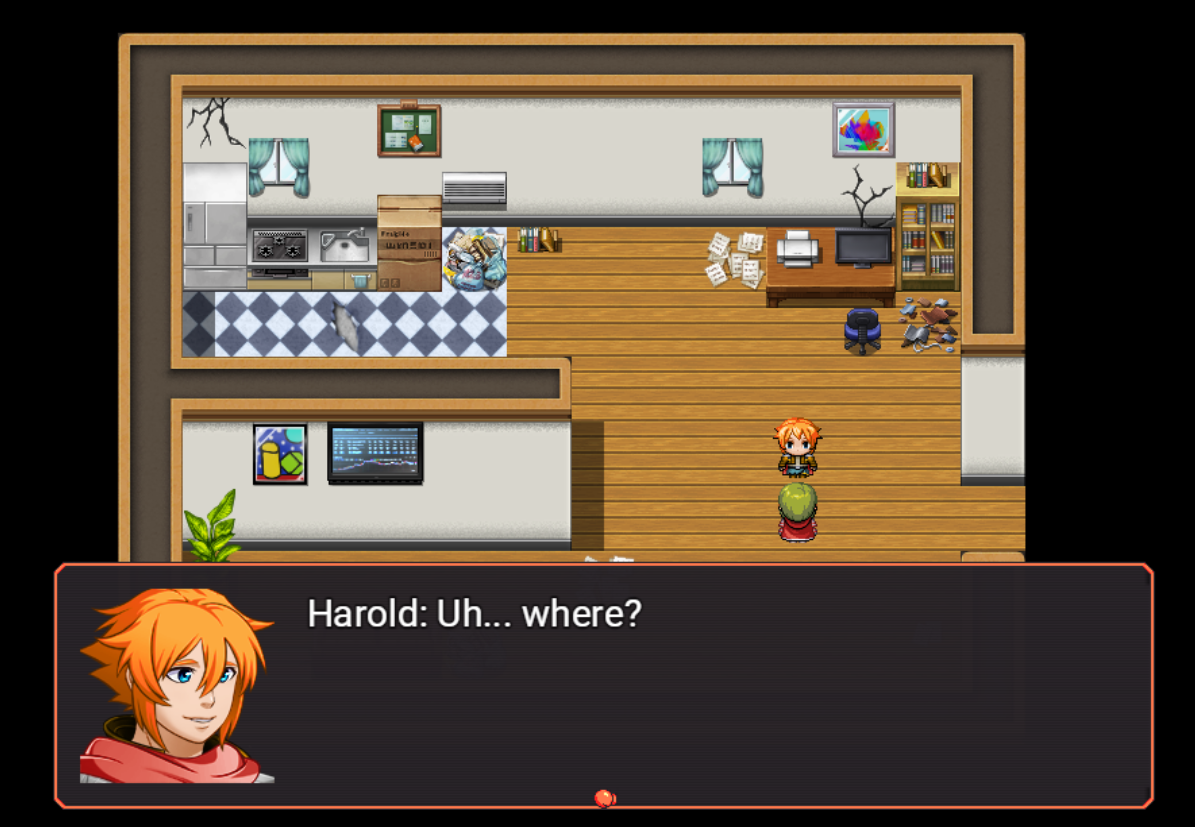
Well, for such a quickly made game, reception was overwhelmingly positive, both before and after the voting period started. People really loved the story, they thought the battle system was engaging, and... that's kinda all there is to the whole game. So, what went right?
-Relatability-
People were able to easily relate to the concept itself. Everyone has regrets, and there's a catharsis to the idea of trying to right those wrongs somehow.
-Writing-
I kinda forgot that I have, like, a kinda specific prose to how I write my characters, and it seems to vibe with people. I have the luxury of having a very active imagination, and character voice just kinda comes to me, so it works out pretty well for me especially in a game with an irreverent tone like this.
-Soundtrack-
I had so much fun writing the music for this one, utilizing a single motif to represent a single character through various stages of his life. Of course, there isn't much to say here, it's Sawyer music, people like it.
-Combat-
My fears seemed to not really affect anyone, since I didn't get complaints about the game being too predictable or too obtuse (aside from a player who played on Quick Run and then complained that you could just spam the attack button, which was my intention on that difficulty)
After the game was finished, I was able to talk to some people who particularly enjoyed it about the battle system and see what their thoughts are, and I think this battle system could have potential in a larger scale game if I were to introduce some more mechanics! I've also grown to like this iteration of Harold quite a lot, so I hope he can return again either in some Harold-centric media, or some Spinel-centric media.
That said, this wasn't a perfect project! Here's what went wrong!
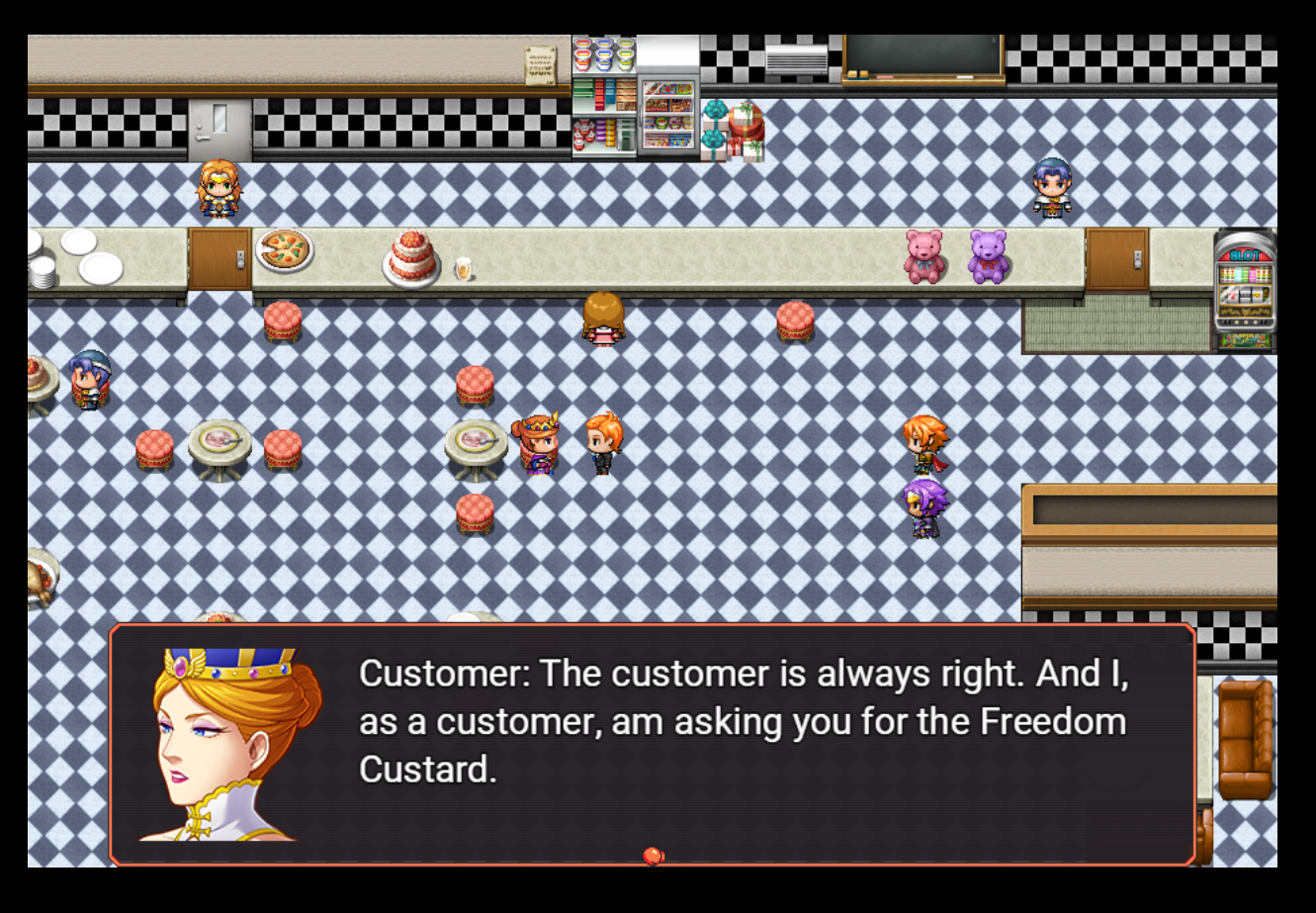
-Art Assets-
After Axial, people grew to expect better from me in terms of art assets. Everyone knows I can make good sprites, even in a variety of art styles, so the RTP combined with my speedy submission definitely raised a connotation of the game being rushed, especially when I still insisted on composing a fully custom chiptune soundtrack.
-Lack of Exploration-
There were a few comments of people upset that the game was just a linear run of cutscenes and combat. I definitely opted for this approach in part because of time constraints, though I also did it this way for the sake of pacing and focus. That said, even some of the most diehard Re:PUNCH fans wished you could move around a bit in the game, so that tells me this presentation might not be a good fit for the types of games I make.
-The Combat-
People did like the combat, but it was often found to be a little taxing due to its puzzle like nature. The consequences of making mistakes were much higher, which were acceptable in a short game but definitely would be draining if translated into a longform title. Furthermore, the Quick Run mode, which I created to allow players less interested in puzzle combat to still complete the game, lead to some players completely ignoring the combat and finding it to be shallow.
I also got a comment that just said "story and combat were jokes" and I'm not sure if that was an insult or a compliment but I hope it was a compliment!
Overall, Re:PUNCH was really well received, and it accomplished multiple goals that I had set out to do. This was pretty much a resounding success in my book, and I'm really looking forward to seeing how it does in the ratings. Anyway, I know this was a weird one to throw at you guys considering it's completely unrelated to Axial, but I thought it might be a nice bit of perspective to see my creative process from the start to the end of a project.
Get Re:PUNCH!!!
Re:PUNCH!!!
A Coming-Of-Age Puzzle RPG Where Damage is Optional
| Status | Released |
| Author | Sawyer Friend |
| Genre | Puzzle, Role Playing |
| Tags | chiptune, Comedy, Coming Of Age, JRPG, RPG Maker, Short, Strategy RPG, Time Travel, Turn-Based Combat |
More posts
- Re:PUNCH OST Available Now!Jun 20, 2022
Leave a comment
Log in with itch.io to leave a comment.